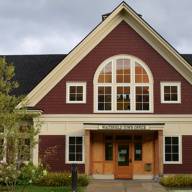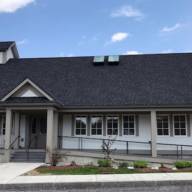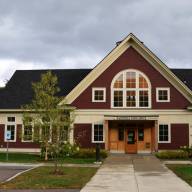The funding landscape for municipal wastewater for Waitsfield has improved with the possibility of state and federal funding eligibility increasing as the town proceeds into final design.
That was the word from Mad River Valley Planning District director Joshua Schwartz who is leading the wastewater planning team for the town of Waitsfield. Schwartz met with the Waitsfield Select Board on January 22 to provide an update on progress, funding, and to share the news that while there is more money available, it will require the town to hold a positive bond vote sooner than anticipated. A June bond vote is now possible.
The town has completed preliminary engineering for a wastewater system that would serve Waitsfield and Irasville Villages. It will be a tertiary treatment system that uses the town-owned Munn Field for disposal. The estimated cost is $15.6 million. All of the costs for a feasibility study, preliminary engineering report and 30% of the final design phase have been covered by ARPA funds and grants from the Clean Water State Revolving Loan fund.
Schwartz said that the state’s next round of Clean Water State Revolving Loan (CWSRL) funding priorities will be released as a draft in March. He said that Waitsfield is expected to have increased its eligibility for funding.
“Last year on that list, Waitsfield was listed as eligible for funding in two areas, a pollution control grant and the state’s ARPA village wastewater grant program,” he explained.
Towns can be preliminarily awarded funding from both of the programs only to have those funds revert to the state if the proposed projects don’t materialize. That leads to what Schwartz called the “trickle down” of previously allocated funds.
At this week’s meeting, Schwartz shared a slide deck that included a slide titled Project Funding Stack is Forming. It lists the possibility of these funds:
- Vermont Pollution Control grant $3 million
- State ARPA village wastewater funds $1 million
- USDA Rural Development grant $4.75 million
- Congressional Direct Spending $3.5 million
- USDA direct loan $2.35 million at 2.25% for 30 years.
Schwartz said that the town’s improved eligibility for these programs is due to the project being much further along than it was last year. Last year Senator Bernie Sanders’ office suggested that the town apply for $10.4 million in congressional direct spending, which the town did. The U.S. Senate Appropriations Committee did not award the funds.
Schwartz said that with the other potential funding sources, the town’s ask from each category was less, increasing the likelihood of awards being made. He also said that there are 15-18 towns in Vermont competing for the trickle-down funds and said that the closer the projects are to shovel ready the greater the chance of receiving funds.
Waitsfield’s eligibility is further improved by the fact that the town owns the land where treatment will occur. Moretown has a CWSRF grant to study wastewater for its village but to date has yet to identify land. The town of Greensboro, The Barton Chronicle reported on January 24, has $6 million earmarked for a wastewater treatment facility including an $800,000 grant. Those funds include a $3.9 million ARPA village wastewater grant that came from the state with the condition that the town have a firm agreement to purchase land for a system. Those are the types of funds that will be clawed back by the state and trickle down to other projects.
“The goal of this project has been to fund it as much as possible through grants to ensure an affordable fee rate for users,” Schwartz said, noting that the low interest rate and long term on a USDA direct loan would help ensure that the project is paid for by users.
After listening to Schwartz spell out how funding options have improved, town administrator Annie Decker-Dell’Isola noted that the board will need to decide at its next meeting on January 29 how and when to proceed with a vote.
The town also has a fair amount of work to do in terms of property owner outreach and public engagement before a bond vote is held.













